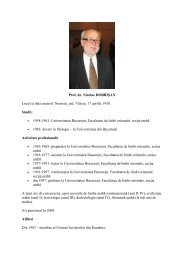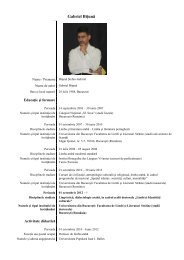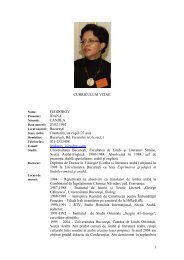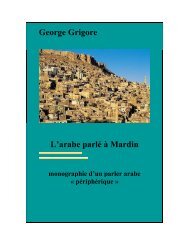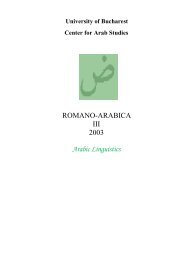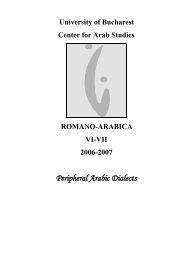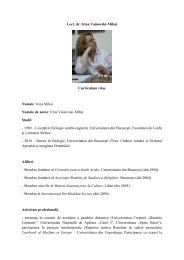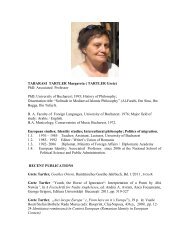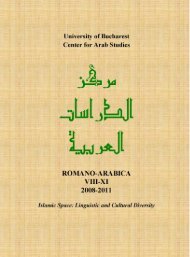- Page 2 and 3: UNIVERSITY OF BUCHAREST CENTER FOR
- Page 4 and 5: CONTENTS Jordi Aguadé, Verbs Refle
- Page 6 and 7: Dictionnaire arabe français by A.
- Page 8 and 9: or miss”. fāq (yfīq) “to wake
- Page 10 and 11: }d}}}a (yər}d}}}i) “to satisfy,
- Page 12 and 13: ≠ lġa (yĭlġi) “to invalidate
- Page 15 and 16: SOME ASPECTS OF NEGATION IN THE LEB
- Page 17 and 18: 1.1. Particle lā The particle lā
- Page 19 and 20: Examples: láh ( = lā ) mā ḫabb
- Page 21 and 22: Recent studies have drawn attention
- Page 23 and 24: A last example with this constructi
- Page 25 and 26: Tamara: mira halla' manna hōn. “
- Page 27 and 28: As seen above, mīš expressing the
- Page 29 and 30: The conclusion can only be that in
- Page 31: Serge: ma ba'a fīnā bass nəfakki
- Page 34 and 35: Pidgins have also been classified o
- Page 38 and 39: DEM all day NEG FI „this wasn‟t
- Page 40 and 41: lāzim kul šay fi mawǧūd (Al-Moa
- Page 42 and 43: 1SG FI bag ruined „My bag is ruin
- Page 44 and 45: A large number of examples illustra
- Page 46 and 47: NEG FI same girl DEM true „the gi
- Page 48 and 49: andomly by speakers unsure of how t
- Page 50 and 51: developed a much wider range of use
- Page 52 and 53: In sum, fi often functions as an ex
- Page 54 and 55: Avram, Andrei A. 1995. „Some stru
- Page 56 and 57: Kumar. 2011a. Poem in Omani Pidgin
- Page 58 and 59: “hidden microphone”) between Ba
- Page 60 and 61: - ānī fakkarit hwāye w hassa atr
- Page 62 and 63: - ’al}l}a, kirkūk, ah}san nās!
- Page 64 and 65: conversation. In order to make his
- Page 66 and 67: - I‟m not going there anymore. It
- Page 68 and 69: Haverkate, Henk. 1994. La cortesía
- Page 70 and 71: Following the above mentioned strat
- Page 72 and 73: chance. Once the computer finds a p
- Page 74 and 75: problem when using the statistical
- Page 76 and 77: 3) katabtu r-risālata bi-„ibr in
- Page 78 and 79: Voices of anger Almarkp that took p
- Page 81 and 82: CLASSIFICATION OF THE INDEPENDENT P
- Page 83 and 84: personal pronoun is considered adje
- Page 85 and 86: Reckendorf (1898: §134, 375) menti
- Page 87 and 88:
association of other gods with Alla
- Page 89 and 90:
d. In the following relative clause
- Page 91 and 92:
―Potiphar‘s wife said: ‗Now t
- Page 93 and 94:
In Q 7:49 the relevant component of
- Page 95 and 96:
2.2.3 Independent personal pronoun
- Page 97 and 98:
equired for are those in which ther
- Page 99 and 100:
This construction has a ―selectiv
- Page 101 and 102:
Bibliography Arberry, Arthur. 1964.
- Page 103 and 104:
IFRANĞĪ / FIRANĞĪ: WHAT LANGUAG
- Page 105 and 106:
d‟une habitude linguistique qui r
- Page 107 and 108:
Qāmūs al-muḥīṭ 10 the root f
- Page 109 and 110:
Arabic works, this usage seems to h
- Page 111 and 112:
traveller Evliya Çelebi, reported
- Page 113 and 114:
Bibliography Aslanov 2002: Cyril As
- Page 115 and 116:
QUELQUES GRAPHÈMES LATINS POLYFONC
- Page 117 and 118:
l’occlusive emphatique /d}/: a) d
- Page 119 and 120:
III. 4. Le graphème [k] Le graphè
- Page 121 and 122:
‘avrā ←‘adrā’ « vierge
- Page 123 and 124:
ZANKA FLOW: RAP EN ÁRABE MARROQUÍ
- Page 125 and 126:
Según Muslim, el tono de voz del e
- Page 127 and 128:
fə-bani Ādam kīfāš wəlla mə
- Page 129 and 130:
ʕṛəf kīfāš džīb mʕāhŭm
- Page 131 and 132:
dyāli hūma lli ʕāwdu li ʕla l-
- Page 133 and 134:
məḥgūṛa ʕlāš dāyma ʕlīn
- Page 135 and 136:
l-ʔabryāʔ hūma ḍ-ḍaḥāya
- Page 137 and 138:
mənnu slāk alguna de él. Estribi
- Page 139 and 140:
wāxxa ṣ-ṣăḥḥa ṭāḥt w
- Page 141 and 142:
mātət ʕāyšīn wāxxa ḥăyāt
- Page 143 and 144:
ylăʕbu lu bīn bnānu yxăwwṣu
- Page 145 and 146:
nādǝm bə-nǝfsu kayṭlǝb ṣ-
- Page 147 and 148:
conducido” (< á.c. دىق). Esto
- Page 149 and 150:
3.2.2. La partícula ʕa- se antepo
- Page 151 and 152:
urales de la región de Jbala: enso
- Page 153 and 154:
Carátula del disco Strictly 4 my s
- Page 155 and 156:
Natividad, E.; “Le dialecte de Ch
- Page 157 and 158:
UN CAS DE TÉRATOLOGIE DÉRIVATIONN
- Page 159 and 160:
d’Ibn al-Anbārī 1 , mais sous u
- Page 161 and 162:
nécessaire 2 , selon cette opinion
- Page 163 and 164:
intéresse : on a, à la fois, un s
- Page 165 and 166:
(« et on a dit : le clitoris, parc
- Page 167 and 168:
LA ZABBŪBIYYA DE ‘ABD AR-RAḤM
- Page 169 and 170:
Toutefois c’est avec le Congrès
- Page 171 and 172:
En conclusion, nous pouvons affirme
- Page 173 and 174:
ma nənsǟw ə š l-kǟhiya w-waīf
- Page 175 and 176:
Tous les walis Tous les princes, le
- Page 177 and 178:
Ecoutez-moi bien enfants d’Eve! E
- Page 179 and 180:
yəmšu) 16 . Ainsi, les verbes dé
- Page 181 and 182:
turque le kahiya était le subordon
- Page 183 and 184:
Annexe Les deux reproductions ci-ap
- Page 185 and 186:
TOPOGRAPHIE SACRÉE ET LÉGITIMATIO
- Page 187 and 188:
variante et absents dans d’autres
- Page 189 and 190:
« À cette époque-là, dans ce jo
- Page 191 and 192:
Une grande partie de l’existence
- Page 193 and 194:
celles consacrées à d’autres sa
- Page 195 and 196:
porte et regarde vers la montagne d
- Page 197 and 198:
fragment que nous trouvons fort él
- Page 199 and 200:
tant que diurétique, analgésique
- Page 201 and 202:
les sanctuaires (yatır), voire les
- Page 203 and 204:
CULTURAL INTERACTIONS IN THE GRAFFI
- Page 205 and 206:
end of war (Zoghbi, 2011:80). In th
- Page 207 and 208:
tension between homogenization and
- Page 209 and 210:
the desire to confront and undermin
- Page 211 and 212:
popular culture connotations like S
- Page 213 and 214:
SOME CONSIDERATIONS ON THE TRANSLAT
- Page 215 and 216:
address term, in order to express t
- Page 217 and 218:
manipulation and adaptation of the
- Page 219 and 220:
The footnote provided by the Romani
- Page 221 and 222:
Mejdell, G. 2006. Mixed styles in s
- Page 223 and 224:
THE PROBLEM OF SUFI ARABIC TEXTS TR
- Page 225 and 226:
ecause, in his opinion, philosophic
- Page 227 and 228:
problem is connected not only with
- Page 229 and 230:
concludes that “original features
- Page 231 and 232:
company and the second company iden
- Page 233 and 234:
STEREOTYPES ABOUT ISLAM AND MEDIA C
- Page 235 and 236:
what he called a “legitimate form
- Page 237 and 238:
stereotypes aren‟t solely an Amer
- Page 239 and 240:
Middle East into a single unified a
- Page 241 and 242:
are many Islams, there are many Wes
- Page 243 and 244:
demanding labor of philology and te
- Page 245 and 246:
Looking at data on French public di
- Page 247 and 248:
V. Patterns in writing and talking
- Page 249 and 250:
that naming is to identify an objec
- Page 251 and 252:
A sample of perpetuating the image
- Page 253 and 254:
in such historically Christian nati
- Page 255 and 256:
jihād, dhimmī are semantically re
- Page 257 and 258:
Levy, Bernard-Henri. 2004. War, evi
- Page 259 and 260:
SOUNDS AND SILENCE IN IBN SI>NA>’
- Page 261 and 262:
audience) in a lahğa maqbūla (a l
- Page 263 and 264:
eing silent, free of any determinat
- Page 265 and 266:
CROSS-CULTURAL AWARENESS AND READAB
- Page 267 and 268:
II. Theoretical Underpinnings 1. Li
- Page 269 and 270:
student and the culture that create
- Page 271 and 272:
In a maqāma style, Al-T{ayyib S{ā
- Page 273 and 274:
that could be given are the questio
- Page 275 and 276:
BOOK REVIEWS A Festschrift for Nadi
- Page 277 and 278:
C. Arabic studies authored by membe
- Page 279 and 280:
and literature contribute to the pr
- Page 281 and 282:
process of grammaticalization in Ar
- Page 283 and 284:
Laura Sitaru, Gândirea politică a



